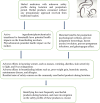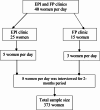Herbal medicine use and associated factors among lactating mothers visiting maternal and child health clinic at Woldia comprehensive specialized hospital, North Wollo Zone, Ethiopia, 2023
- PMID: 40517276
- PMCID: PMC12167588
- DOI: 10.1186/s41043-025-00875-6
Herbal medicine use and associated factors among lactating mothers visiting maternal and child health clinic at Woldia comprehensive specialized hospital, North Wollo Zone, Ethiopia, 2023
Abstract
Introduction: Globally, reproductive-age women appear to be the major users of herbal products, particularly during pregnancy and breastfeeding. Despite safety concerns, lactating women in Ethiopia use herbal products to increase their milk supply or to treat ailments. Thus, the current study aimed to assess the prevalence of herbal medicine use and associated factors among lactating women visiting maternal and child health clinics at Woldia Comprehensive Specialized Hospital.
Methods: A cross-sectional study was conducted on 362 lactating women who visited the Expanded Program Immunization and Family Planning Clinics at Woldia Comprehensive Specialized Hospital from February 1 to April 30, 2023. The study participants were chosen using a systematic sampling method. Data were collected using a structured questionnaire through face-to-face interviews and entered using EPI-Data version 4.2.0. It was then analyzed using SPSS version 25. A binary logistic regression model was used to identify factors associated with the use of herbal medicine. Statistical significance was considered at a p-value of less than 0.05 in the final model. The findings were presented using texts, tables, and graphical representations.
Results: Out of 362 pregnant women who participated in this study, 150 (41.43%, 95% CI: 36.3, 46.5%) used herbal products during their lactating period. The most frequently used herbal products during lactation were Zingiber officinale 73 (48.6%), followed by Lepidium sativum 67 (44.6%), Ocimum lamifolium 60 (40%), and Linum usitatissimum 53 (35.3%). Among lactating mothers attending the clinics, factors associated with herbal medicine use included having a positive attitude toward herbal medicine use (AOR = 5.6; 95% CI = 3.1,9.9), having a history of using herbal products (AOR = 2.2; 95% CI = 1.2,3.9), lacking postpartum counseling (AOR = 2.6; 95% CI = 1.2,5.7), living further away from medical facilities (AOR = 2.8; 95% CI = 1.7, 4,8), and earning less than 5000 ETB per month (AOR = 3.5; 95% CI: 1.0, 12.2).
Conclusions: In the study area, herbal medicine use was a common practice among lactating mothers. Factors influencing this trend include women's attitudes toward herbal medicine, postpartum counseling, and their previous experiences with such remedies. Therefore, it is crucial to prioritize efforts aimed at shifting the perceptions of reproductive women regarding herbal medicine use and to enhance postpartum counseling. Further, it is essential to emphasize the potential risks of certain herbal medicines, especially those with unknown safety profiles, as they can significantly impact the health of the women and breastfeeding infants.
Keywords: Child health; Ethiopia; Herbal medicine; Hospital; Lactating.
© 2025. The Author(s).
Conflict of interest statement
Declarations. Ethics approval and consent to participate: This study was conducted with the utmost respect for ethical standards, following the Declaration of Helsinki. We obtained ethical clearance from the Ethical Review Committee of Woldia University, College of Health Sciences (Ref. No. 03/2023, dated January 15, 2023). The researcher prioritized the will of every participant, obtaining verbal consent and communicating the study’s purpose: to enhance maternal and child health outcomes. Participation was entirely voluntary, ensuring that no lactating woman felt pressured to join. Each participant was assured that their data would be handled with strict confidentiality, using codes instead of personal identifiers, and that the information gathered was solely intended to advance our knowledge in this vital area. Consent for publication: Not applicable. Competing interests: The authors declare no competing interests.
Figures




Similar articles
-
Magnitude and Associated Factors of Herbal Medicine Use During Pregnancy Among Women Attending Antenatal Care in Public Health Institutions of Central Tigray, Northern Ethiopia (2020): Facility-Based Cross-Sectional Study.J Pregnancy. 2024 Oct 18;2024:9932851. doi: 10.1155/2024/9932851. eCollection 2024. J Pregnancy. 2024. PMID: 39464196 Free PMC article.
-
Breast feeding techniques and associated factors among lactating primipara mothers during the postpartum period in Debre Markos health institutions, North West Ethiopia.J Pediatr Nurs. 2024 Jul-Aug;77:e458-e464. doi: 10.1016/j.pedn.2024.05.010. Epub 2024 May 10. J Pediatr Nurs. 2024. PMID: 38729893
-
Breast problems and associated factors among lactating women in Northeast Ethiopia, 2022.Sci Rep. 2024 Apr 22;14(1):9202. doi: 10.1038/s41598-024-58957-0. Sci Rep. 2024. PMID: 38649435 Free PMC article.
-
Indigenous herbal medicine use and its associated factors among pregnant women attending antenatal care at public health facilities in Dire Dawa, Ethiopia: a cross-sectional study.BMJ Open. 2024 Jun 3;14(6):e079719. doi: 10.1136/bmjopen-2023-079719. BMJ Open. 2024. PMID: 38830740 Free PMC article.
-
Level of exclusive breastfeeding and its enabling factors among lactating women who delivered in health facilities of Asosa town, Ethiopia: a cross sectional study.BMC Womens Health. 2021 Dec 28;21(1):432. doi: 10.1186/s12905-021-01580-2. BMC Womens Health. 2021. PMID: 34961489 Free PMC article.
References
-
- Amaro A, Baptista FI, Matafome P. Programming of future generations during breastfeeding: the intricate relation between metabolic and neurodevelopment disorders. Life Sci. 2022;298:120526. - PubMed
-
- Mills E, et al. Herbal medicines in pregnancy and lactation: an evidence-based approach. New York: Taylor & Francis London; 2006.
MeSH terms
LinkOut - more resources
Full Text Sources
Medical
Miscellaneous

